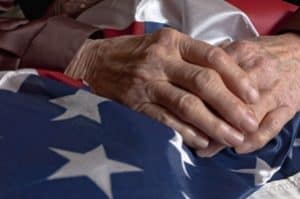Yes. The Department of Veterans Affairs (VA) stopped using the name Gulf War Syndrometo refer to these clusters of chronic symptoms with no known causes because the signs of this class of illness can vary significantly from person to person. The condition is now referred to as a chronic multi-symptom illness or an undiagnosed illness.
You may qualify for veterans’ disability benefits if you have:
Symptoms of these illnesses can include:
You do no need to demonstrate a connection between your service and your illness if:
Having an unexplained illness can be scary. Continuing with your medical care is important, and learning how to be compensated for your service-connected illness is important, too. To find out more about your options, talk to one of the knowledgeable Texas veterans’ disability lawyers at Morgan Weisbrod today. Contact us toll-free or through this website for more information.

 Many Navy veterans are concerned about asbestos exposure, and with good reason. Symptoms from exposure-related illnesses can take 20 to 50 years to manifest. Unfortunately, by this point, illnesses have usually progressed to advanced stages. Thus, it is important for Navy veterans to know if they may have been exposed to asbestos, to know what health conditions could develop because of that exposure, and to understand the veterans’ disability benefits they may receive if they become sick.
Many Navy veterans are concerned about asbestos exposure, and with good reason. Symptoms from exposure-related illnesses can take 20 to 50 years to manifest. Unfortunately, by this point, illnesses have usually progressed to advanced stages. Thus, it is important for Navy veterans to know if they may have been exposed to asbestos, to know what health conditions could develop because of that exposure, and to understand the veterans’ disability benefits they may receive if they become sick.
Until restrictions were placed on its use in the 1970s, asbestos offered a heat- and fire-resistant building material that was both inexpensive and durable. Though it was most often used in areas that needed a degree of heat resistance, U.S. Naval vessels of the era used the material in hundreds of applications: from boiler rooms and ammunition storage rooms to bunkers and the mess hall.
The most hazardous areas of U.S. Naval vessels for asbestos exposure were below deck. Navy veterans with the most exposure risk will have spent a lot of time in the lower areas of the ship, such as the:
However, asbestos-sealed wiring and pipes were often exposed for ease of access throughout the ship—meaning it was possible for a veteran to sleep in a bunker beneath materials that were regularly shedding asbestos fibers.
People who are exposed to asbestos may breathe in the tiny asbestos fibers and suffering lung-related illnesses, such as:
All of these conditions are serious and require a prompt medical diagnosis and quick treatment.
If you are a veteran who was not dishonorably discharged, were exposed to asbestos while in military service, and have developed an asbestos-related illness, you may be eligible to receive veterans’ disability benefits. Our experienced disability lawyers will work hard to get you the full benefits you deserve. Please contact us via this website or by phone today to learn more.

It’s not at all unusual for a veteran to feel the way your friend did about the interview segment of a C&P—or Compensation and Pension—Exam.
The first thing you should remember is that the Department of Veterans Affairs (VA) physician handling the exam is trying to obtain the best possible understanding of your situation. Because of this, the questions he or she asks will generally be with the purpose of determining or confirming the following:
Many of the questions in the C&P interview might make you feel uncomfortable, vulnerable, or like the doctor doesn’t trust you. However, no matter how the questions make you feel, keep in mind the following:
You are allowed to bring a friend or family member with you to the exam if that makes you more comfortable. However, your friend or family member cannot answer questions on your behalf. The physician wants to hear from you.
Keep in mind that the VA encourages you to report any negative experiences with your C&P physician examiner as soon as possible. You can do that by contacting the physician’s supervisor, a VA patient advocate, or by calling the number on your appointment letter.
If you need more help in preparing for a C&P exam or any other aspect of the veterans’ disability claims process, please contact our experienced veterans disability benefits attorney for a no-cost consultation today.

 It used to be that most Texas veterans could complete their initial veterans’ disability applications without even needing to consider an attorney’s representation.
It used to be that most Texas veterans could complete their initial veterans’ disability applications without even needing to consider an attorney’s representation.
While it could be argued that this is still the case for many veterans, issues like the backlog in the Department of Veterans Affairs and the difficulties of substantiating disabilities related to neurological or emotional health are changing the general rule. Now, some veterans are deciding to talk to an attorney before their initial filing for disability benefits to ensure everything is on track.
It might be a good idea to consider hiring an experienced veterans’ disability attorney if:
Additionally, if you have already applied for benefits and been denied or you disagree with your disability ratings score, it is important to hire an attorney to help you protect your rights during the appeals process.
You aren’t making any commitment by contacting an attorney. If we believe you can handle filing a veterans disability claim on your own, we will tell you that. Likewise, if we believe we can help you get the veterans disability benefits you deserve, we will explain how we can do that.
The disability attorneys of Morgan Weisbrod have the knowledge and experience necessary to help you get your veterans disability benefits case on track and headed toward the best possible outcome. Please contact us any time—via this website or by phone—for more information about how to protect your rights.

Individual Unemployability (IU) is a type of disability compensation offered by the Department of Veterans Affairs (VA). IU pays out disability benefits at the total, or 100%, disability rate even though the veteran’s service-connected disabilities have been rated at a lower level if the veteran is unable to engage in substantially gainful employment. The option provides a safety net for veterans who find themselves unable to work because of their service injuries but who do not receive a total disability rating.
In order to qualify for IU compensation, the veteran must be unable to maintain “substantially gainful employment” because of his service-connected disabilities.
Substantially gainful employment describes employment where a non-disabled individual is able to earn an income level appropriate for that occupation in the community where the veteran lives. This would be a job providing the veteran with full-time employment at a liveable wage.
For VA purposes, marginal employment is not viewed as substantially gainful. Marginal employment describes employment where the veteran’s earned income is not more than the poverty level established by the U.S. Census Bureau for the community where the veteran lives. Thus, you may be able to work part time or do odd jobs and still qualify for IU disability benefits.
If you are a veteran and you think you may qualify for IU disability compensation from the VA—or if you have any questions about the VA disability benefits application and appeals process—consider reviewing your case with an experienced veterans’ disability attorney as soon as possible. We can help you fill out VA form 21-8940, “Veteran’s Application for Increased Compensation Based on Unemployability,” and advise you about the steps you should take to protect all of your rights.

Though only a medical professional can diagnose and treat complications arising from severe burn injuries, there are some issues that tend to commonly affect veterans with service-connected injuries of this nature. If you’ve been burned, it is important to know what conditions may affect you and whether you may be eligible for veterans’ disability benefits.
Some of the issues that tend to come up following econd, third, and fourth degree burns include:
If you suffer from any of these burn complications because of an injury sustained during your service to our country, it is important to know how to apply for veterans’ disability benefits.
Even if you qualify for veterans’ disability benefits, your receipt of benefits will not be automatic. You need to apply to the Department of Veterans Affairs and provide information about your service, your discharge, and your disability. You can save time and get the benefits you deserve by talking to an experienced veterans’ disability lawyer about your rights and about how to complete your application. For more information, please contact us any time via this website or by phone. We would be happy to talk to you about getting the fair benefits you deserve.

According to the Internal Revenue Service (IRS), disability benefits received from the Department of Veterans Affairs (VA) should not be included with your gross income on your federal tax returns. These benefits are specifically excluded by federal law. Additionally, Texas does not currently have a state income tax so your disability benefits will not be subject to state income tax if you reside in Texas.
Your monthly veterans’ disability benefits are not the only veterans’ disability benefits that are excluded from your general income for tax purposes. Other federal veterans’ benefits that are not taxable include:
Any other disability benefits you receive through programs that are not run by the Department of Veterans Affairs may be subject to different tax rules.
As a veteran of the United States armed services, you deserve to get all of the benefits to which you are legally entitled. This includes the full amount of disability benefits for which you qualify. You should not subject yourself to paying more in taxes than you legally owe unless you wish to do so voluntarily.
If you have any questions about state or federal tax liability for your veterans’ disability benefits, it is important to speak to your accountant directly. Similarly, if you have any questions about your eligibility for veterans’ disability benefits, you should speak to an experienced Texas disability lawyer at Morgan Weisbrod. Please contact us via this website or by phone to schedule a meeting and to make sure you get the fair benefits you deserve.

 Yes, you may be eligible for veterans’ disability benefits if you were in the National Guard and you were hurt during active duty. A member of the National Guard is considered to be on active duty if the member is serving:
Yes, you may be eligible for veterans’ disability benefits if you were in the National Guard and you were hurt during active duty. A member of the National Guard is considered to be on active duty if the member is serving:
Recent examples of National Guard members being called into active duty include the conflicts in Iraq and Afghanistan and Hurricane Katrina.
It is important to note that although those in the National Guard who are injured during active duty can receive veterans’ disability benefits, each individual case is different and each case must also meet the requirements of any other veterans’ disability claim. For example, your claim must prove that your condition was caused by or exacerbated by your active duty and you must not have been dishonorably discharged.
According to recent data collected through the Freedom of Information Act, it is significantly harder for National Guard members and reservists to receive veterans’ disability benefits than it is for other service members. The data shows that reservists who served in Iraq and Afghanistan after 9/11 were four times more likely to be denied benefits than active duty military members.
Out of approximately 70,000 military men and women who have been denied VA disability payments, 60 percent of denials were issued to National Guard members and reservists, even though this segment makes up only 40 percent of the veteran population.
In order to know if you should apply for veterans’ disability benefits, please contact a Texas disability benefits attorney about the details of your case and your history in the National Guard. Morgan Weisbrod offers all veterans a free, private meeting in which you can discuss your disability and your plan for the future. Call today for more information.

 Veterans’ disability benefits are generally only available to veterans who were discharged under other than dishonorable conditions. In other words, you may be eligible for veterans’ disability benefits if you received an honorable discharge or a general discharge from the military, but you are not eligible if you received a dishonorable discharge.
Veterans’ disability benefits are generally only available to veterans who were discharged under other than dishonorable conditions. In other words, you may be eligible for veterans’ disability benefits if you received an honorable discharge or a general discharge from the military, but you are not eligible if you received a dishonorable discharge.
A dishonorable discharge is only handed down to those who have been court-martialed for a serious offense, such as desertion or assault. It is possible to appeal your dishonorable discharge and perhaps get it downgraded to a different type of administrative discharge—even a few years after your military service ends. If you believe that your dishonorable discharge is incorrect, you should take action to protect your rights and any veterans’ benefits that may be rightfully available to you.
You may be eligible for veterans’ disability benefits if you received a bad conduct discharge (BCD) or an other-than-honorable discharge (OTH). In these two cases, you may wish to speak to a veterans’ disability attorney about your case. While some former service members have successfully fought for VA disability benefits despite an OTH discharge, others have been denied. Your case may depend on the reason for your discharge and whether it was related to your physical and mental health issues at the time.
Veterans’ disability benefits can have a significant impact on your future. If you think you may qualify for such benefits, or if you have questions about your eligibility for veterans’ disability benefits, we encourage you to contact an experienced disability lawyer as soon as possible to discuss your case and to make sure your rights are protected. Please call us today or reach out to us via this website for additional information.


Homeless man
Even if you don’t have a permanent address or a place to call your own, you can still qualify for veterans’ disability benefits. Homelessness should not prevent you from recovering veterans’ disability benefits if you qualify for such benefits.
Since 2010, the number of homeless veterans in the United States has been cut in half according to information from the United States Department of Veterans Affairs (VA). Yet in Texas alone there were an estimated 2,393 homeless veterans in 2016—putting Texas among the top five states in the country with homeless veterans.
Many homeless veterans suffer significant disabilities such as post-traumatic stress disorder (PTSD), brain injuries, amputations, and other injuries that prevent them from earning a living wage and supporting themselves. If you suffer one of these disabilities—or any other that is connected to your time in the service—you may qualify for veterans’ disability benefits.
Homeless veterans are eligible for all of the same veterans’ assistance programs as other veterans—including disability benefits if they so qualify. To find out if you qualify for veterans’ disability benefits, you must fill out a complete application with the VA. While the process may seem overwhelming, an attorney can help you through it so that you get the benefits you deserve.
In addition to veterans’ disability benefits, the Department of Veterans Affairs offers homeless veterans and veterans in danger of becoming homeless a number of programs and resources to help keep them sheltered and off the streets. These homeless veteran programs involve different types of assistance, including job training and placement, substance abuse programs, general health care, and mental health counseling.
If you are a homeless veteran seeking disability benefits, you should know that we are here to help. Please contact our experienced attorneys directly via this website or by phone to set up an initial, no-obligation consultation and to make sure you are getting all of the benefits you have earned.

© 2025 Morgan Weisbrod, All Rights Reserved, Reproduced with Permission Privacy Policy | Site Map